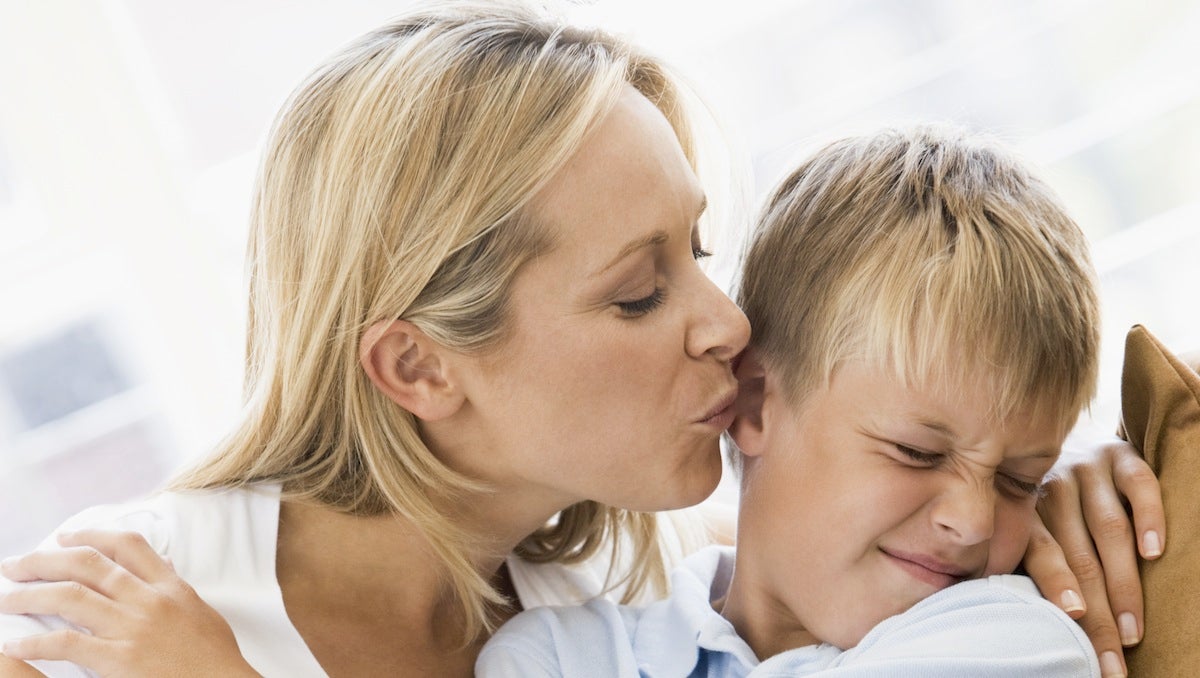When everything a mother does suddenly becomes embarrassing for her children
 Embarrassed child photo via ShutterStock " title="shutterstock_15881125" width="1" height="1"/>
Embarrassed child photo via ShutterStock " title="shutterstock_15881125" width="1" height="1"/>
Embarrassed child photo via ShutterStock
My oldest daughter, upon reaching the sophisticated age of 8, recently listed the top five things I do that embarrass her.
According to Georgia, my offenses include asking her friends too many questions, conversing with strangers, kissing her and her twin brother at the bus stop, singing in public and rolling down the minivan window to greet her classmates as they trudge home from school.
“It’s so embarrassing,” Georgia muttered.
“OK,” I said, striving for compassion and struggling to understand.
After all, my daughter had just condemned in one swipe my inherently extroverted nature, one that I doubted I could curb this deep into middle age. Can I help it, I internally protested, that I like to express myself, that I’m interested in others?
I enjoy talking to my children’s friends and to people in general. Plus, I think I’m good at it. Years of practice have enabled me to discern through carefully aimed chitchat that the grocery store clerk is unhappy about the management shift and that our mailman never married because of a domineering mother. The strength of my love enables me to plant public kisses on my children’s cheeks. And I refuse to let the fact that I’m no Taylor Swift prevent me from singing her songs, regardless of where I am.
But since Georgia has decided that my natural tendencies — tendencies that other people might consider virtues — are now causing her nightmarish levels of shame, I have been feeling a bit constrained.
“How’s school going?” I asked one of my daughter’s friends when she came to play the other day.
“Mom, stop!” Georgia exclaimed. “You’re embarrassing me!”
At a recent Girl Scout meeting, my daughter scolded me for trying to help her fellow Brownie thread a bead onto a necklace. And just last week I had to fight the urge to shout salutations out the car window to Georgia and Griffin’s classmates.
“Don’t say anything!” my daughter commanded from the backseat.
My twins no longer let me near them at the bus stop, not even close enough to air kiss the atmosphere circulating around their heads. And now, according to Georgia, I’m not even allowed to sing in the privacy of my own home.
“Men of Harlech! In the hollow! Do ye hear like rushing billow!” I lustily sang the other afternoon while sorting laundry, recalling an old Welsh air I had learned in my youth.
“Stop, mom!” Georgia shouted from her room
As I continued to fold and obstinately hum, a little more quietly now, I took an uncomfortable stroll down memory lane, re-treading some of the mortifying territory of my own childhood.
I’ll tell you about embarrassing, I mentally harangued my kids. Embarrassing was learning to drive in the family’s rusted red Oldsmobile station wagon with a missing front grill and a novelty license plate, a gift from my father to my mother, which read “MOUTH.” Embarrassing was having friends who were over to play ask why costumed mannequins sprawled around our house — in the bay window, on the piano — and realizing I couldn’t explain.
Held up to these unsavory recollections, my “Men of Harlech” and “Hiyas!” to my children’s friends hardly seemed liked high crimes. My kids had no idea how good they had it, I thought. And I started to feel just a tiny bit resentful.
My resentment only increased a few days later when we were walking our dog and signing “A Bushel and a Peck,” and my 4-year-old suddenly halted, spying another mother approaching with a stroller.
“And a barrel and a heap,” I continued.
“Stop!” Jane hissed. “At least wait till she’s gone!”
I was confused by my daughter’s sudden self-consciousness. It was bad enough that my 8-year-olds were censoring me, but Jane was only 4.
So when Jane’s dance teacher recently handed out the recital costumes with their peacock beading and multi-colored tulle — a moment my daughter had been eagerly anticipating all winter — I submitted to my instincts and began cooing in excitement.
“How pretty!” I cried, as I helped Jane step into her tutu. She glared at me, on the brink of tears, and finally put her hand over my mouth to quiet my exclamations. Startled by my daughter’s reaction, I couldn’t help noticing the other girls cheerily posing as their mothers and caregivers snapped pictures.
“What was the matter?” I later asked Jane.
“You just get too excited whenever I get something pretty,” she sobbed out.
“She doesn’t want you to make such a big deal,” Georgia added.
“Yeah,” Griffin said. “It’s really embarrassing.”
Even he — the loyal one, my only son — didn’t want me to come to his final basketball game last weekend.
“You cheer too loud,” Griffin confessed when I pressed him.
“Paul calls to all the players really loudly, too,” my husband said, coming to my defense.
“Yeah,” Griffin said, “but he’s a coach.”
I insisted on going anyway, nursing my wounded motherhood in the minivan during the ride. But as I watched my second-grader on the court, trying to screw up his courage to grab the ball and sort out how to navigate this world of bigger boys, I tried not to shout my encouragement to the rafters.
And I suddenly realized that in this moment I couldn’t help him, that Griffin couldn’t process my cheering, that he had to figure this one out for himself — and that what really hurt about embarrassing my children was that it meant they were growing up.
WHYY is your source for fact-based, in-depth journalism and information. As a nonprofit organization, we rely on financial support from readers like you. Please give today.

